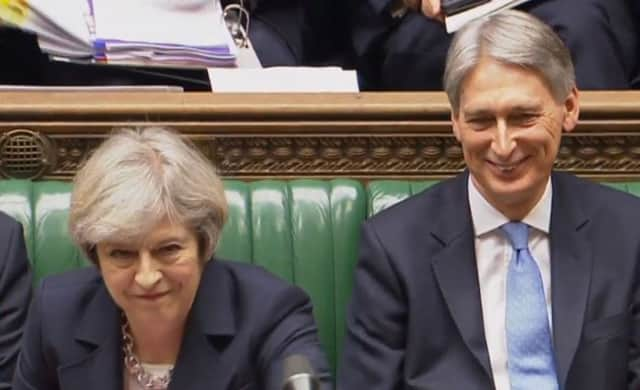YP Comment: High price of Budget U-turn. Power rests with backbenchers


Even though Labour leader Jeremy Corbyn failed to make his mark, the U-turn does, in fact, reveal the fragility of Theresa May’s Commons majority and how Ministers can be held to ransom by the mere threat of a backbench rebellion – this is where the real power now appears to lie in Parliament and the decision will make party discipline even harder to enforce in the future.
Economically, this measure was proposed because the Treasury believes there will be a £2bn ‘black hole’ in its finances unless the self-employed start making a greater contribution towards the provision of key public services. Where is the money going to come from?
Advertisement
Hide AdAdvertisement
Hide AdSimply kicking the issue into the long grass, as part of the review into employment practices being undertaken by Royal Society of the Arts chief executive Matthew Taylor, does not overcome the fact that the Tories promised at the last election not to raise National Insurance contributions.
Politically, these mixed messages are disturbing as Mrs May prepares to trigger Article 50. If the Government failed to foresee this difficulty, namely Chancellor Philip Hammond’s proposal contravened the Tory manifesto, it does not inspire confidence in its Brexit strategy. This was self-evident when Brexit Secretary David Davis effectively rebuked Boris Johnson, the Foreign Secretary, by saying that he does his job “on the basis of facts and data and research” while his colleague gives “throwaway lines in interviews”. With the threat of Scottish independence compounding matters, the Government needs to start pulling in the same direction.
Duty of Ministers
IT speaks volumes about the dysfunctional nature of the Chilcot inquiry into the Iraq war that this seven-year investigation has now required a report into the report. This is not surprising – the original report, which amounted to 2.6 million words, took so long to undertake that there are clearly lessons to be learned about the parameters of such scrutiny exercises in future.
Following such a laborious and time-consuming inquiry, the succinct findings of Parliament’s Public Accounts Committee are perhaps the more pertinent and highlight the importance for far clearer decision-making protocols in the unwelcome event of Britain having to send its Armed Forces into battle at some stage in the future.
Advertisement
Hide AdAdvertisement
Hide AdIts central conclusion could not have been clearer: “The time to learn these lessons from the Iraq Inquiry and to implement them is now.”
Yet, while future premiers will never again be allowed to act as unilaterally as Tony Blair did prior to Iraq, MPs say the Cabinet Secretary’s assurance that there is no risk to collective decision-making responsibility under Theresa May, this is not a fail-safe. The importance of this is profound. In essence, it is an instruction to Ministers that it is their job to properly scrutinise the case for military intervention and challenge the intelligence where necessary – they are the first line of defence. In short, it’s their duty to uphold the public interest and think through every consequence of war. If only this happened prior to the Iraq invasion when too many senior politicians did not ask the necessary questions until it was too late.
Testing times
IT’S not all that long ago that cancer was the disease which dared not speak its name. When we did talk about it, we refrained from saying the word out loud. Fearing perhaps it would bring bad luck, we instead referred to it as ‘the Big C’.
How times have changed. While cancer will always be a painful and cruel disease, often afflicting those who seem to have the most to live for, sufferers are gaining strength from more and more people speaking about their own experiences.
Advertisement
Hide AdAdvertisement
Hide AdRochelle Gold, from Leeds, has already undergone a double mastectomy. Soon she will have a full hysterectomy in an effort to reduce her risk of developing breast cancer. However, she is also on a mission to save the lives of others by raising awareness of genetic cancer testing.
The mother of two’s story is a brave and powerful one. Just like Yorkshire Cancer Research, the charity which her family supports through tireless fundraising, her efforts will now give others a fighting chance of survival.